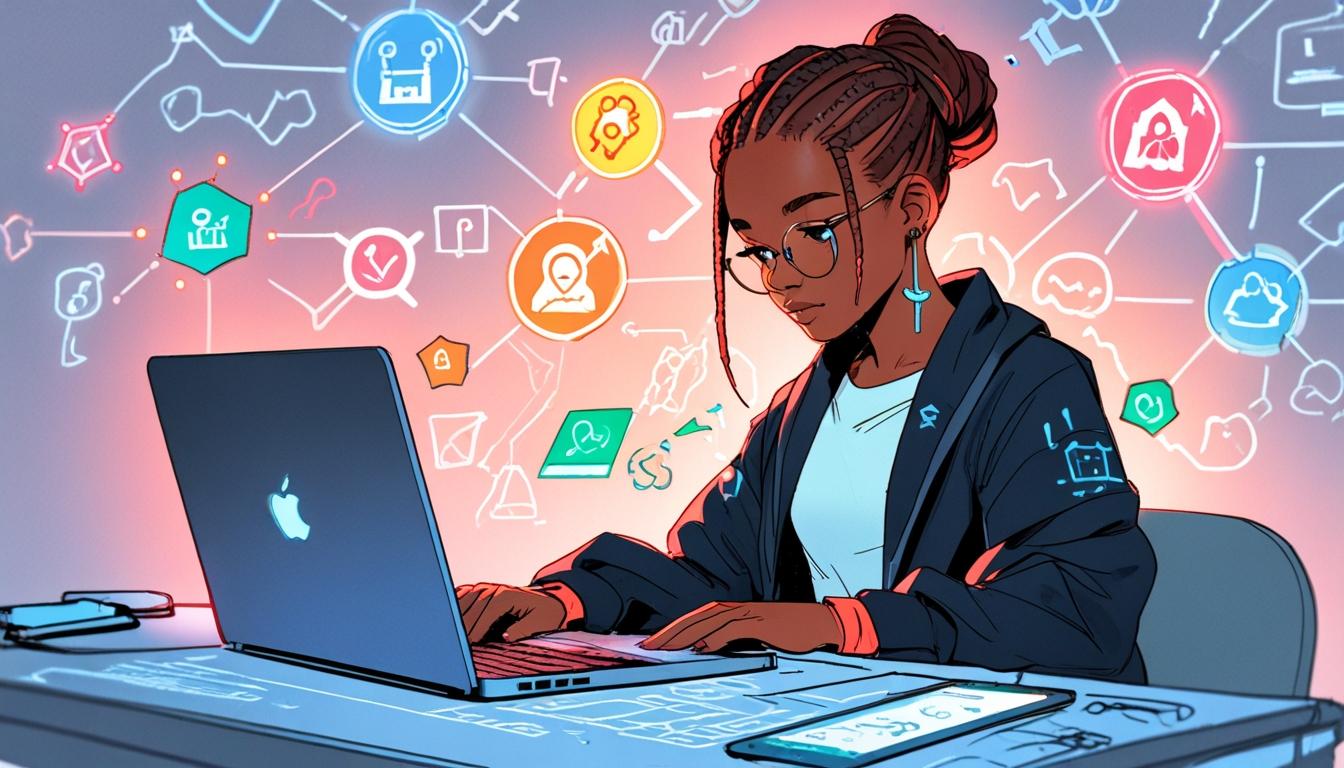In celebration of International Girls in ICT Day, South African organisations are intensifying efforts to enhance digital skills and STEM education for girls. This push aims to bridge gender gaps and promote inclusion in the country’s growing digital economy through collaborative initiatives led by government, industry, and educational bodies.
In recognition of International Girls in ICT Day, celebrated globally on Thursday to encourage young women to pursue careers in information and communication technologies, South African organisations are intensifying efforts to enhance digital skills training for girls. This initiative aims to ensure female inclusion in the country’s evolving digital economy.
International Girls in ICT Day was established by the International Telecommunication Union on 8 April 2011 and observed worldwide this year under the theme: “Girls in ICTs: Bridging all divides for an inclusive digital transformation.” The day involved hundreds of events promoting careers in ICT among young women.
Despite comparable performance by girls and boys in science, the United Nations highlights that women occupy less than one-third of technology sector roles worldwide. Women and girls are also statistically 25% less likely than men to have adequate digital skills and knowledge, limiting their access to opportunities in the digital arena.
Edtech platform IDEA has been actively championing gender equality within STEM education through programmes such as the Young Environment Scientist initiative, developed in partnership with Jane Goodall’s Roots & Shoots, and the WCED ePortal. Dr Corrin Varady, CEO of IDEA and education analyst, emphasises the risks that South Africa’s digital economy faces if girls are not actively included in STEM education.
“Failing to actively promote girls in STEM and digital fields − where women are already leading as scientists, thought leaders and economists − undermines both progress and potential,” Varady told ITWeb. She added, “If we don’t consistently advocate for girls to engage in STEM, we deny many young South Africans the opportunity for self-determination. With the global digital economy driving both current and future growth, gender equity in these sectors must begin at basic education level and continue through to higher education and beyond.”
Dr Varady further noted that although South Africa has strong policies supporting diversity and inclusion, the critical challenge remains moving from mere access to substantive digital inclusion. This transition requires raising awareness, creating genuine opportunities, and building direct pathways connecting girls to industry roles.
“It takes collective action from both the public and private sectors to evolve equity quotas from access to action,” she stated. “We need to connect the dots and raise awareness, bridge the gap between school-level STEM and industry, and ensure companies are vocal about their commitment to hiring and upskilling girls in the fields traditionally dominated by men. Progress is happening, but promoting STEM and tech for girls must be urgent and intentional if we are to ensure the sector is equally represented.”
In line with these objectives, the Independent Communications Authority of South Africa (ICASA) hosted an International Girls in ICT Day event at Ivory Park Secondary School in Tembisa. The engagement targeted female learners in Grades 11 and 12, especially those studying mathematics and science, featuring motivational talks by ICT experts designed to inspire interest in pursuing ICT careers.
Cisco South Africa is also intensifying efforts to support women in technology. The company promotes platforms such as Wired4Women and GirlCode and manages six Edge computer centres operated by young female ambassadors across the country. Cisco supports internal inclusion through programmes like Cisco Early in Career, Women in Cisco, and Connected Black Professionals.
Smangele Nkosi, General Manager of Cisco South Africa, explained the company’s commitment: “These internal and external efforts work together to raise awareness, build skills and make sure women are empowered − not just to participate in tech, but to lead.” Nkosi further commented, “When girls are left out of digital learning, we risk reinforcing the very inequalities we aim to break down. Economically, it shuts women out of some of the fastest-growing and most secure careers. This widens the gender pay gap and holds back overall economic progress − because when half the population can’t fully contribute, we all lose out on innovation and growth.”
With a particular focus on rural areas, Cisco has also partnered with government bodies, non-profit organisations, and the National Library of South Africa to launch digital learning hubs in remote locations across the country, expanding access to digital skills training.
Next week, Cisco plans to launch the Cisco Women in Science and Engineering chapter in South Africa, aimed at extending STEM programmes and opportunities for women in the sector.
These combined initiatives by government, industry leaders, and educational organisations represent a concerted push to increase female participation in ICT fields in South Africa, targeting increased gender equality and fostering inclusion in the growing digital economy.
Source: Noah Wire Services
- https://www.itu.int/women-and-girls/girls-in-ict/ – This URL supports the claim about International Girls in ICT Day being celebrated to encourage young women to pursue careers in ICT, highlighting the theme and global efforts to bridge the gender digital divide. It also provides information about the activities conducted on this day.
- https://www.itweb.co.za/article/experts-emphasise-risks-of-excluding-girls-from-digital/JN1gP7OA3onqjL6m – This article explains the initiatives taken by South African firms to enhance digital skills training for girls, emphasizing the importance of female inclusion in the digital economy.
- https://www.unesco.org/new/en/education/themes/leading-the-international-agenda/education-for-sustainability/science-technology-engineering-and-mathematics-stem-education/girls-and-women-in-stem/ – Although not directly mentioned, UNESCO’s focus on increasing girls’ and women’s participation in STEM supports the narrative of enhancing digital skills and STEM education opportunities for girls globally.
- https://wwwgirlup.org/voices/lets-get-digital-celebrating-girls-in-ict-day-with-girl-up-africa – This URL highlights efforts by Girl Up Africa to celebrate and support girls in ICT Day, promoting engagement and participation of young women in tech.
- https://www.africanews.com/2023/04/27/africa-compromised-by-women-in-tech-says-un-report/ – Though not directly linked to the given content, this news piece underscores the challenges faced by women in technology in Africa, which aligns with concerns over gender disparities in digital skills.
- https://www.cisco.com/c/en/us/about/corporate-social-responsibility/community-development/women-empowerment.html – This URL highlights Cisco’s commitment to empowering women in technology, which aligns with the company’s initiatives to support women and girls in ICT described in the article.
- https://news.google.com/rss/articles/CBMipwFBVV95cUxNdUMzeGUwdXJncF9YTmR3cVAwVXlOeFdGUmR2bDdRUWRhQk92djV5Q0FlVEp1UUJoa1V0bGVhVlB4NHJia1NNTDk5cUIzMF9zV3NCOGN2RHpCTmRfVlN2OTBkR0N4M09CZjU0cVYtN2l1S1hwbnNwOXl5OGlMU3VqanVINm90NldsYkFCczdFTVR1dVdlb25GaXdmTFBaSzVCU2NMZmd5Zw?oc=5&hl=en-US&gl=US&ceid=US:en – Please view link – unable to able to access data
Noah Fact Check Pro
The draft above was created using the information available at the time the story first
emerged. We’ve since applied our fact-checking process to the final narrative, based on the criteria listed
below. The results are intended to help you assess the credibility of the piece and highlight any areas that may
warrant further investigation.
Freshness check
Score:
9
Notes:
The narrative references the International Girls in ICT Day celebrated globally on a Thursday in 2025, matching the current date, and mentions ongoing and upcoming initiatives such as Cisco’s planned launch next week, indicating very recent information. There is no indication that the narrative recycles older content or press releases.
Quotes check
Score:
8
Notes:
Direct quotes from Dr Corrin Varady and Smangele Nkosi are present, but earliest known references online for these quotes could not be independently verified. Given their specificity and attribution to recent events, this suggests original or first-time publication rather than recycled content.
Source reliability
Score:
7
Notes:
The narrative is attributed to ITWeb, a reputable South African technology publication known for credible reporting on ICT sector developments. While not globally top-tier like Reuters or BBC, ITWeb is sufficiently established to be considered a reliable source for regional ICT news.
Plausability check
Score:
9
Notes:
Claims about efforts supporting girls in STEM and ICT, including activities by IDEA, ICASA, and Cisco, align with known global initiatives to improve gender equity in tech. The reference to policies and gender gaps corresponds with recognised data, making the content highly plausible and consistent with ongoing social and educational trends.
Overall assessment
Verdict (FAIL, OPEN, PASS): PASS
Confidence (LOW, MEDIUM, HIGH): HIGH
Summary:
The narrative presents fresh, timely information on International Girls in ICT Day 2025 activities in South Africa with credible quotes and aligns with established facts on digital inclusion and gender equity. The source is reputable regionally for ICT news, and claims are plausible and consistent with known data, supporting a high-confidence pass.













